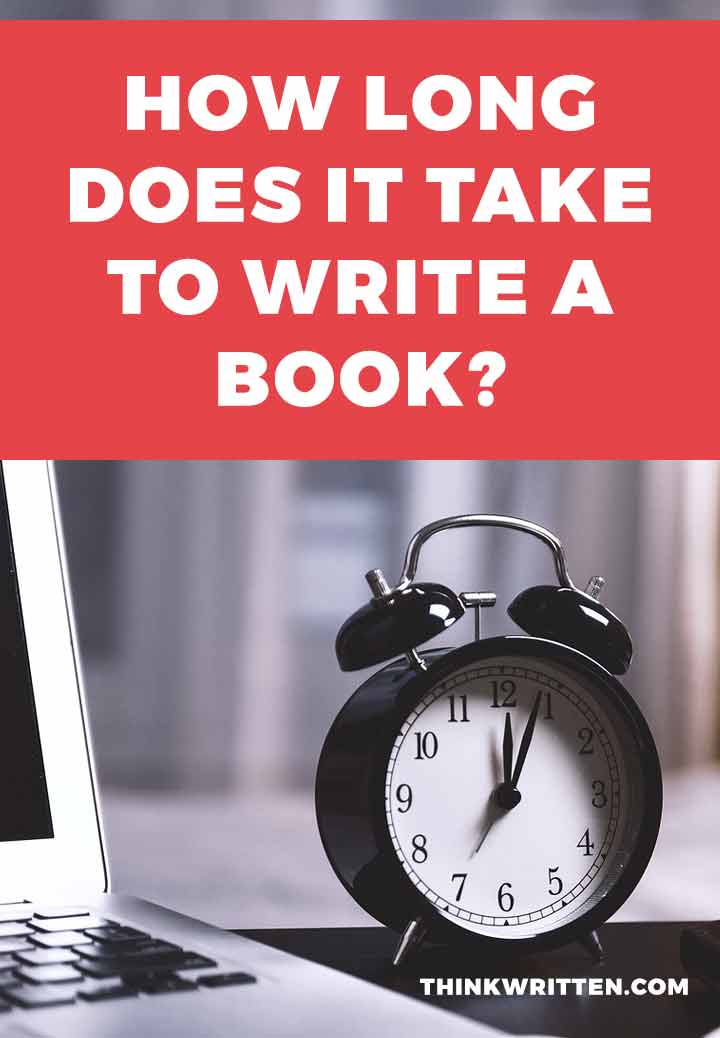We may receive a commission when you make a purchase from one of our links for products and services we recommend. As an Amazon Associate we earn from qualifying purchases. Thank you for support!
Think you don’t have enough time to write a book?
It’s probably one of the most common reasons NOT to write a book. I hear a very similar story from a lot of aspiring writers. “I want to write a book, but I just don’t have the time.”
And it’s true: it does require some time to write a book. However, contrary to popular belief, it DOES NOT have to take months or years to write a book.
Today I want to answer the question of “How long does it take to write a book?” and give you an honest assessment of how long it takes to write a book.
With National Novel Writing Month, also known as NaNoWriMo, just around the corner, many people are wondering if it is a good idea to challenge yourself to write a book in 30 days or less.
We’ll look at some different considerations to help you determine a realistic timeframe for whether or not you really can write a book in 30 days, plus understand why you just don’t have time to write that book you’ve been yearning to.
Spoiler Alert: The reason you haven’t written a book yet has nothing to do with how much time it takes.
Let’s Do The Math: This is The Fastest You Can Physically Write a Book
How fast can you write a book? Well, we can answer this with math.
Let’s just say, for example’s sake, that you can type 60 words per minute. Of course, you may type a little bit faster or a little bit slower, but if you are unsure of your true typing speed you of course can always take a free online typing test.
We will also take the average word count of a novel, which is 70,000 words.
This equation will give us a good idea of what might be physically possible. Maybe not recommended. Maybe not accurate. Definitely not true for every person or every type of book.
However, at the very least, we will be aware of what might be physically possible.
A simple equation: Take the number of words in a novel, and divide it by the number of words you can type per minute.
So, let’s do the math. If you type 60 words per minute, and your book is the average novel length of 70,000 words, we can solve this math equation easily.
70,000 words ÷ 60 words = 1,167 minutes.
Now, let’s convert those minutes into hours. To calculate the writing time, we simply need to convert minutes into hours. There are 60 minutes in 1 hour, so we can calculate how many hours just by dividing our number 1,167 by 60.
1,167 minutes ÷ 60 minutes = 19.45 hours.
So, basically, in under 20 hours, you could theoretically write a book. You could have your book written in less that 24 hours from now.
I expect your manuscript in my inbox by tomorrow morning.
What!?! An Entire Novel in 20 Hours!!!! That’s Impossible!!!!
Yes, of course it is impossible. Maybe if you think only about the typing aspect involved it is technically possible. For most of us however, it is completely unrealistic.
A lot more goes into writing a book than just typing, and so I know 20 hours is not a realistic amount of time to give you to write a book. So don’t worry: I fully do not expect your manuscript on my desk tomorrow.
Not only do I not expect it, I don’t recommend it.
{Side note: I also don’t recommend you use more exclamation points than words in an article heading….but hey, here we are.}
Writing an entire novel in 20 hours, or even 24 hours, even if it is physically possible, is nowhere near realistic.
5 Really Good Reasons You Should Not Even Attempt to Write a Book in 24 Hours
Just in case you would be tempted to achieve the impossible, let me make 5 very convincing arguments on why writing a book in 24 hours is a horrible idea.
1. Your Body Deserves Better
As a writer, it is very important to take care of your physical health.
For starters, if you attempted to write a book in 24 hours, no doubt after about 12 hours your wrists and eyes and back will start to hurt. Sitting in any one position for 20 hours cannot possibly be healthy for you.
I know for myself my physical limit in any one 24-hour time span is about 15,000 words. That’s while writing with an ergonomic desk chair and taking frequent breaks to walk around and give the body and mind a stretch.
You also need to eat. I know I am guilty sometimes of getting caught up in writing and not eating. Combine that with the magic appetite suppressant known as coffee and it’s easy to be wired and write all day and night long.
However, our bodies need nurtured and we need healthy foods to survive. Writing, for many people, myself included, may feel like a necessity right up there with breathing.
However, without food we really cannot exist. Take breaks from writing. Eat. Sleep. Treat your physical self well.
2. Your Social Life Deserves Better
Writing is hard to do while someone else is in the room. However, writing while isolating yourself from the rest of the world can also cause undesired results.
Locking yourself away from the world to write can cause your relationships to suffer. While it may sound like a dream, it can be very hard to fix a relationship that suffers from a lack of involvement. If you find yourself yelling at family members because you are trying to write and they are interrupting you, it’s time to take a break and re-examine your priorities.
Is a novel worth your family or friends thinking you never have time or interest for them? Most likely not – especially if one of your goals in life is to have healthy relationships with others. Like it or not, you need to take breaks from writing and spend time with people.
Besides, there are added perks to real life human to human conversations and interactions. Having actual conversations with real people is one of the best ways to build on your dialogue writing skills.
Loneliness can also be a problem for many writers . This is why if nothing else it can be helpful to join a local writing group.
3. Your Sanity is Important
I’m sure we could agree all writers are insane. However, let me give you a great nugget of wisdom: It is OK to think about crazy things, it is NOT OK to ACT on crazy thoughts.
For example, let’s say you are a crime thriller writer – it’s okay to write about crimes, but you of course know it’s also very much NOT OKAY to actually commit crimes.
Now, when your body and mind are well cared for and functioning properly, this is very easy to understand and perfectly logical common sense.
However, when you do not take care of your mind and body, the brain starts to go haywire. All logic and rational thought goes missing. You are more likely to make irresponsible decisions, be impulsive, or ride a rollercoaster of short-fused emotional highs and lows.
If you go days without any sleep or food, at best you will be moody and irritable. At worst, you could end up making some poor decisions that could potentially endanger your own safety and well-being or the welfare of others.
4. Writing Burnout is Real

Have you ever experienced writing burn out? It’s when you write so much you get burnt out and suddenly feel like you don’t want to write.
You spent all these days writing and writing, you neglected your physical health and your emotional health, and your family began resenting that you exist weeks ago.
You wake up, do your morning routine, and then walk into your writers studio space to start writing – and nothing. You type, you delete. You write, and you read what you’ve written and realize it is totally horrible and will end up being completely scrapped in the revision part.
You decide you don’t really feel like writing, so you instead find any and every possible reason NOT to write. Most of these are things that aren’t exactly super important, and really aren’t anything you would normally do.
This is when the notion of doing anything that is not writing, even if it is something terrible you would normally want to do sounds more appealing. If the idea of scrubbing your kitchen floor with a tooth brush sounds way more fun and exciting than writing, you are experiencing writing burn out and avoidance.
In worse scenarios, the burn-out period happens after you write the book. The book is written – but you don’t have the energy left to work on revisions. The thought of sending query letters on this masterpiece is simply too emotionally and physically draining.
More often than not however, this happens long before the first draft of the book is anywhere near finished.
Instead of writing a book, you end up having an existential crisis nearly daily. The daily question becomes, “What am I even doing with my life?”
Writer’s burn-out can cause a lot of problems, and while it can be avoided, treatment can be difficult. The only way you can recover from burn-out is to do something completely unrelated for awhile. This might mean taking up a tactile hobby like knitting or traveling the countryside for a few months.
You do not want to experience this. Your writing will come to a complete standstill. No matter how productive you might have been in the beginning – it won’t matter. You will never finish that book if burnout takes hold.
If you do manage to successfully recover from burn-out, it is highly likely you will come back to the novel, and decide to scrap the entire project. You will start a vicious cycle of starting a book and never finishing them.
The best way to think about it is like this: Writing a book is a marathon, not a sprint.
5. The Hidden Time Costs to Writing a Book
Finally, in case the first 4 reasons weren’t convincing enough for you, we all know there is a lot more to writing than just typing.
That 20 hours does not include any time for planning your novel outline, researching data, revising or editing, sending query letters to publishers, or marketing your book after it is published.
Some writing experts claim that you should just as much time revising as you might spend writing. So, if it takes 20 hours to write a book, we can expect it might take another 20 hours to revise.
I find the 50 write/50 revise ratio fairly accurate, although this may not be necessarily true for everyone.
So really, if factor some time for all of these things, our new calculation for time would be as follows.
- Planning/Outline/Research Time: 5 Hours
- Typing Time: 20 Hours
- First Revision Time: 20 Hours
- Editing Time: 10 Hours
- Gathering Feedback on the Book: 8 Hours
- Final Revision/Editing: 10 Hours
- Finding & Choosing a Publishing Method: 18 Hours
- Formatting the Book & Cover Design: 15 Hours
- Marketing a Book: 20 Hours
Let’s add this all together now. 5 + 20 + 20 + 10 + 8 + 10 + 12 + 20 = 120.
There we have it: It takes at least 120 hours to actually properly write a book. Of course, some things like marketing the book are going to be longer, because you don’t just market a book once and forget about it! However, for simplicity sake, we’ll only include what we might do at the initial launch.
It’s also important to note these are just general time frames for each activity. Every writer is different. Some writers for example might put in 20 hours for planning and research.
As you may imagine, while 120 hours might be totally much more realistic for time to write a book than 24 hours, it’s still not exactly accurate.
The biggest reason? No one can work for 120 hours straight. If you do not believe this, go back and review reasons 1 through 4 for why you should not attempt to write a book in an unrealistic amount of time.
How Many Days Does it Take to Write a Book?
In order to understand how long it might take to write a book, we should probably divide these hours into realistic amounts per day. None of us can go days without food, water, sleep, or breaks, so understanding the number of days will make it a lot easier.
This will give us a much more honest assessment of how much time is reasonable to expect we should write a book.
Break it Down Into a Schedule
Let’s say that we work 6 hours a day. In about 6 hours, you could easily write/type about 2,500 words. This would also give you some time for planning and research.
By that measure, if you write 2,500 words a day, it is reasonable to expect your first draft would be complete in about 28 days of time.
Of course, if you go by our “24 hours to type example” – then that would mean the fastest physically possible time it would take to write that rough manuscript is about 4 days, if you are writing 6 hours a day.
So yes, if you want to give the NaNoWriMo writing challenge a shot this November, of course it is do-able.
Factoring in The Hidden Elements of Writing a Book
Of course, we should also calculate the time we spend for the other necessary steps of finishing a book. This is the revisions, the rewriting, the editing, the marketing, etc.
We’ll stick with a 6 hour workday to calculate this. When you figure the typical job is 40 hours a week, working 8 hours per day, a 6 hour workday is not too much to expect.
If you work 6 hours a day, we can calculate this by dividing the total number of hours by the number of hours worked each day. 120 hours ÷ 6 hours = 60 days.
Of course, we should also give ourselves some days off. 60 days is approximately 2 months, or the equivalent of 8 weeks, depending where the calendar falls. This would mean we need to add 2 days for each week so we can have the weekends for some serious care and feeding of writers time.
2 days per week off x 8 weeks of working = 16 days necessary to not write.
16 + 60 = 76.
There we have it: It takes 76 days to write a book.
Where it gets tricky of course is that we have to juggle that desire to write a book with real-life responsibilities. You need to make money to survive, which means you likely have to work somewhere.
That probably means about 8 hours a day not writing a book, until you get to the point where writing books becomes your full-time job.
And while you could write on the times you don’t work that regular job, it still exponentially increases the amount of time it will take to write a book.
Let’s say you work on a sporadic writing schedule and average about 8 hours of writing a week.
120 hours divided by 8 hours = 15 weeks. That’s 105 days.
The Schedule is Different for Everyone
Each of us has different things happening in our lives. I totally undersatnd crazy and unpredictable schedules. I have a husband, kids, pets, family, friends – life can sometimes make the schedule crazy.
However, in most cases if you want to write, you will find time to write. And if that means you only have 3 hours available to write per week, you spend those 3 hours writing.
In 40 weeks, you’ll have a book. And it’s okay if it takes that long. In those cases, you didn’t spend that entire 40 weeks writing – you simply had to spread it out with the rest of life. That is completely realistic and understandable.
Here’s the Real Reason You Have No Time to Write a Book
In this article we’ve shown you could write a book in less than 24 hours, although of course we don’t recommend that. We’ve also shown a realistic and balanced time frame of 76 days.
And then, we even factored in trying to schedule in writing time if you have a full-time job or family to take care of.
We’ve given you examples that show, no matter how you do it, you DO have time to write a book. Sometime between now and 365 days from now.
The reason you haven’t written a book, clearly has nothing to do with time. There is all the time in the world to write this book.
So what’s the real reason?
You are afraid to write the book.
Writing a Book is Absolutely Terrifying
It’s true, writing a novel is scary. And the reason you are experiencing writer’s block or writing avoidance is because YOU ARE AFRAID TO WRITE THE BOOK.
Fear is a very strong motivator. It also is very good at wearing disguises.
You might read this and shake your head and say, no, no, I’m not afraid to write the book. It’s just I have to take care of my family/walk the dog/go to work/pay the bills/insert-any-reason-or-excuse-here.
The subject of fear is perhaps not the book itself, but you DO have fear in some other place.
Fear most often disguises itself as guilt. If you take 3 hours a week to write the book instead of spending time with the family, you might feel guilty.
The fear in that case is fearing that you aren’t a good spouse/parent/child/sibling/friend.
Maybe you are afraid that no one will read the book when you finish it. Maybe you’re like me and are actually afraid people will read the book once its done. After all, we can’t have critics if we don’t have an audience.
If you aren’t writing, but you want to be, it’s a good idea to think about your fears. We’ve just proven there IS time to write that book – and you can do it, once it becomes something you are not afraid to prioritize.
Writing a book also does not have to be any sort of crazy all-for-nothing-all-at-once dash. Balance is key, and as we all know from reading Aesop fables, slow and steady wins the race.
When Will You Write Your Book? How Much Time Do You Think is Reasonable as an Expectation?
The amount of time it takes to write a book of course is different for everyone. I do think 120 days is a somewhat reasonable expectation, but again, you should not be too hard on yourself if it takes longer. Some of the most popular authors have taken 3-6 years to write just one book, while others crank out 3-6 books in a year. It’s different for everyone.
And of course, if you do decide to go the traditional publishing house method of querying, it could very realistically be a year or longer between the query letter and the finished book in your hands.
What’s important is you face your fears as a writer, make time for writing, and stay motivated while writing to get that book finally finished!
What are your thoughts? What do you think is a reasonable time frame for writing a book? We would love to hear your experiences and thoughts in the comments section below!














Wow!! Thank you for this information. I do have fear of writing a book. I have a couple of them in mind. One is a Memoir. My question for you on this thought, can a person put fictional charcters in a Memoir?
As for the average time frame for writing a book, I would not know since I have not written one.
Hi Teresa, Memoirs typically describe non-fiction accounts of your life and personal narratives. However, there’s no reason why you couldn’t write a fiction book where the main fictional character is writing their own memoir. You may also want to look into creative non-fiction, which gives a little more flexibility in the way the story is told. Hope that helps!
I like the new-math system you have, it beats my old one.
[total number of hours by the number of hours worked each day. 120 hours ÷ 6 hours = 60 days.] I got this wrong, I my answer was 20 days.
[120 hours divided by 8 hours = 15 weeks] same thing happened here, I used to think that 120 hours divided by 8 hours per day worked out to 15 days – your 15 weeks is much more impressive.
I bet your advice on writing is also pretty sound too.
Robert makes a good point. I wish you could explain that, because after the 120 ÷ 6 = 60 days, you use that figure (in the form of 60 days = 2 months) to make other assertions. It seems like it should be 20 days, or 3 weeks, as the basis of the other statements that follow, rather than two months.
Come on, Robert… Lighten up. Good writers are very often bad at math. And good mathematicians are very often bad at writing. And social skills in general. :p